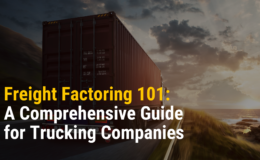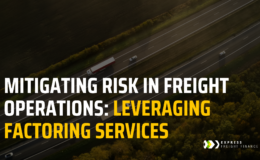Understanding How Freight Factoring Rates are Figured, Plus a Top-Down View of Common Fees
Freight factoring can be a game changer for trucking companies, helping them keep their cash flow moving and offering a wealth of other benefits. While freight factoring is oftentimes more affordable than you might think, carriers must understand the true costs of freight factoring.
In this article, we’ll help you understand the things that affect freight factoring costs and the fees you can expect. This information can be used to empower carriers to make smarter business decisions for their unique circumstances.
How is Your Freight Factoring Rate Figured?
Several factors affect your freight factoring rate and, therefore, the total cost of freight factoring. Express Freight Finance and other factoring services use the following variables to determine your factoring rate:
Credit History and Age of Business
Your credit score and how long you’ve been in business play a critical role in calculating your freight factoring rate. A minimum score of 530 and at least 90 days in business are common requirements to qualify for freight factoring.
Customers’ Credit History
Unlike traditional financing, your factoring rate is determined not only by your business’s creditworthiness but also by your customers’ creditworthiness. Factoring services need to know that they have the ability and inclination to pay on time.
Volume of Invoices Factored
Factoring services commonly charge a percentage of the load payment, often ranging from 1% to 5% of the total load payment. We recommend shopping around and getting quotes from multiple freight factoring companies to find a rate that works for you.
Recourse VS Non-Recourse Factoring
Choosing recourse or non-recourse factoring could have a huge impact on your business’s finances, so it’s important that you understand the difference between recourse and non-recourse factoring. With a recourse agreement, you could be held liable if a customer fails to pay or files bankruptcy, while a non-recourse agreement generally means you are not liable.
The Time It Takes Customers to Pay
If your customers pay late, it could cost you. Getting familiar with your freight factoring agreement can ensure surprise late fees don’t sneak up on you. These types of fees can accumulate when customers don’t pay within the specified timeframe.
Fees You Can Expect from Freight Factoring
Freight-factoring contracts often stipulate fees that will be charged. By understanding what these fees are and how and when they are assessed, carriers can get a heads-up on how much freight factoring will actually cost them.
Application Fee
Just like countless other types of financing, freight factoring services often charge a one-time application fee to ensure you’re committed to the agreement.
Setup Fees
This one-time fee helps cover administrative and legal costs to get your account up and running.
Credit Check Fees
Credit checks cost money. These one-time fees are assessed to cover the costs of credit checks for your business and your customers, helping your freight factoring service assess creditworthiness.
Wire Transfer or Money Disbursement Fees
These fees cover the cost of moving money around. Carriers may be charged wire transfer fees or other disbursement fees.
Due Diligence Fees
Due diligence fees are sometimes required to show that your trucking company is interested in obtaining a freight factoring agreement.
Late Fees
The terms and conditions in your factoring agreement will outline how and when late fees are assessed and apply when customers pay their invoices late.
Customer Service Fees
Some factoring services charge additional fees for utilizing customer service. This is especially true in large organizations.
Processing Fees
Processing fees are sometimes charged to cover the initial costs of processing your application, including things like verifying invoices and various documents. Look closely at what processing fees cover in your factoring agreement.
Invoice Discounting Fees
These types of fees are specific to certain types of factoring agreements and involve obtaining a specific amount of money while maintaining control of the ledger.
Fees for Failing to Meet Minimum Invoice Volume
Some factoring agreements will include minimum invoice volume requirements. If you don’t factor enough invoices, additional fees may be assessed.
Cancellation Fees
Check your agreement for cancellation fees, which may be applied if you opt out of your contract before a specifically stated term. These fees help factoring companies recover lost profits.
Freight factoring can help trucking companies of all sizes manage their cash flow and make smarter business decisions, but knowledge is power when it comes to any type of financial agreement. Carriers need to understand exactly how much these services will cost so they can plan and make the right choices for their business at any given time, taking advantage of all the benefits of freight factoring in a way that fits their business model.







